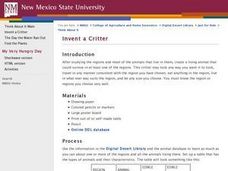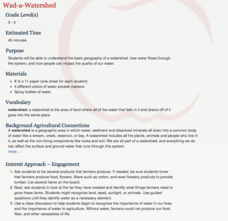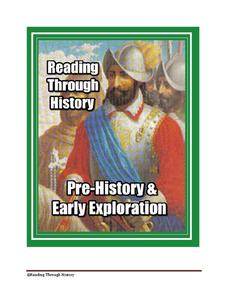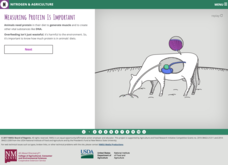Agriculture in the Classroom
Build it Better
If you think you can do better, feel free to give it a try. Pupils learn about the work on Temple Grandin and consider ways to improve animal handling facilities. They work in groups to build models to showcase their ideas.
Agriculture in the Classroom
Roll of the Genes
Animal reproduction in sheep and cattle is explored with the help of Punnet squares. Scholars employ tools using probability to conclude the color of wool a sheep's offspring will have. Acting as animal geneticists, pupils then take...
Curated OER
Oil Spill Lesson Plans
With the recent oil spill in the Gulf of Mexico, now is a great time to educate students on issues related to oil.
Curated OER
Pleistocene Mammals
Students research the causes of the extinction of Pleistocene mammals. In this Pleistocene mammals instructional activity, students read essays to understand the Pleistocene epoch. Students write an essay about the personal impact of...
Curated OER
Why Do Geese Fly South For the Winter?
Fifth graders examine migration by tracing animal migration routes on a map. In this animal life lesson, 5th graders observe a map of North America and read about the migration patterns of geese. Students trace the path most geese take...
Curated OER
Simulated Bark Paintings
Young scholars create simulated, traditional Native American "bark paintings" out of brown paper bags. They paint flowers, birds, animals or scenes of village life on the "bark" in bright colors using acrylic paint.
Curated OER
Turtle Fun Facts
In this turtles worksheet, students read two pages of facts about turtles. Students match four kinds of turtle pictures to their habitats.
Curated OER
Invent a Critter
Students create a living animal that could survive in at least one specific region and use the digital desert library to gather information. In this invent a critter lesson, students draw a picture of their animal, describe their animal...
Curated OER
El Nino and Its Effects
Students research El Nino and its effects all over North America using Web Resources. Working in teams, they present their findings. They look for connections and relationships between animal behavior and climate.
Curated OER
Who's Your Neighbor?
High schoolers recognize and identify some of the fauna groups found in deep-sea coral reef communities. They describe common feeding strategies used by benthic animals in deep-sea coral reef communities.Students be able
Curated OER
Rainforest
Students explore and study an activity that reinforces counting skills and drawing rain forest animals in their math storybooks. They brainstorm what type of animals they think they'd see in the rain forest, birds as well as colors. Each...
Sargent Art
Native American Storyteller Sculptures
The Cochiti Pueblo Indians make lovely dolls out of clay. These dolls are storytellers, just like the kids in your class. Have youngsters read, write, and investigate the origin and purpose of these great artifacts. Then have them use...
K12 Reader
Eastern Woodland Natives
Supplement your social studies instruction with a reading passage about the Eastern Woodlands. After reading the passage, learners respond to five related questions.
Curated OER
Let's go to the Video Tape!
Using actual data from a deep-sea video survey, high school marine biologists consider the biodiversity, compare species richness between two communities, and learn to calculate the diversity index. The lesson plan is all-inclusive,...
Agriculture in the Classroom
Wad-a-Watershed
What kind of impact do humans have on watersheds? Find out in a lesson that defines, explores, and promotes ways to protect our watersheds. The ultimate goal of the lesson is for learners to discover how a watershed is impacted by...
Curated OER
Butterflies
In this science and reading comprehension worksheet, students read a 1 page detailed passage about butterflies. Students then answer 7 questions.
Teaching Ideas
The Aztecs
Did you know the Aztecs had two different calendars? Or that Aztec men could have more than one wife? Find out more about this ancient civilization including how they lived, what they ate, and their cultures and beliefs with a set of 20...
Reading Through History
Early History and Exploration Unit
We all know about Christopher Columbus, but who else explored the Americas, and specifically, the future United States of America? Learners find out these answers and more in a resource that includes four different reading sections,...
Learning Games Lab
Nitrogen in Feed
Knowing what farmers are feeding livestock is just smart business. A WebQuest lesson helps learners build an understanding of the relationship between amino acids, nitrogen, and protein. With interactive instruction, scholars practice...
Curated OER
Living in the Desert
Conduct an investigation on the plants used by the Hohokam tribe. To survive in the harsh desert environment the Hohokam used many natural resources. Learners read, research, map, and graph multiple aspects of Hohokam plant use as a...
Curated OER
Separate Vacations
Students plot the migration paths of birds using latitude and longitude data from a table.
Curated OER
A Dollar Goes A Long Way
Investigate life along the Old Spanish Trail! They visit websites and identify the history and environment. They create journals, dramatic enactments, and maps to discover the role individuals played in society. They also explore the...
Curated OER
Hopi Running
Students identify why the Hopi tribe practiced running as it relates to health, delivering messages, defeating other tribes, and for ceremonial events. In this social studies lesson, students use maps to identify latitude and longitude...
K12 Reader
Coyote: The Survivor of North America
Coyotes in Chicago? Yip. Middle schoolers demonstrate their ability to identify details that support the idea that coyotes are adaptable creatures.

























